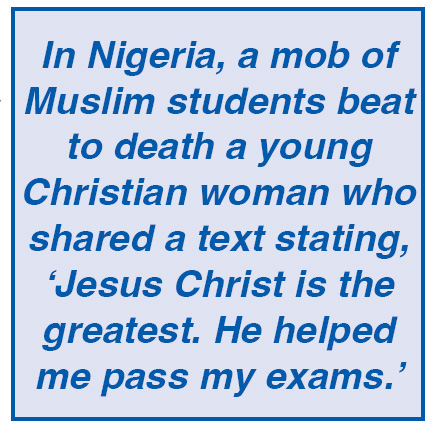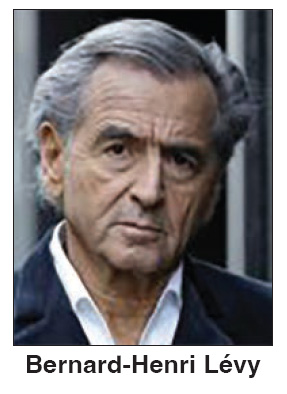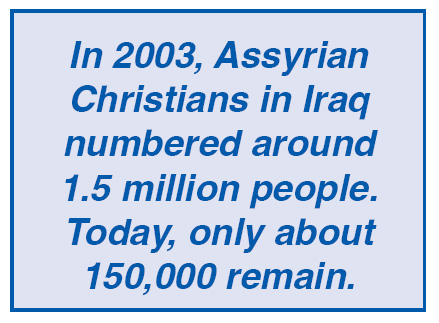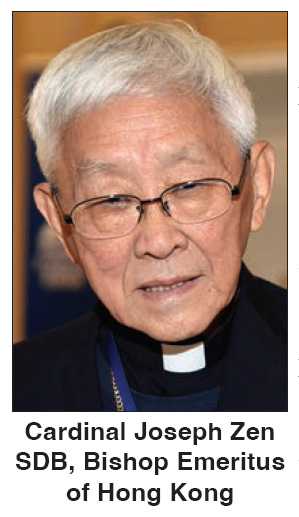
Persecution of Christians intensifies around the globe
 While Catholics and evangelical Christians — including
Supreme Court justices, churches and crisis pregnancy
centres — have come under attack in America, Christians on
other continents continue to endure massacres, imprisonment,
kidnappings and mutilation. Persecution occurs in Africa, the
Middle East and Asia.
While Catholics and evangelical Christians — including
Supreme Court justices, churches and crisis pregnancy
centres — have come under attack in America, Christians on
other continents continue to endure massacres, imprisonment,
kidnappings and mutilation. Persecution occurs in Africa, the
Middle East and Asia.
In January 2021, the Christian advocacy group Open Doors reported that "more than 340 million Christians — one in eight — face high levels of persecution and discrimination because of their faith". Moreover, the number of Christians killed for their religion around the world increased by 60 per cent from 2020 to 2021.
Anti-Catholic and anti-Protestant campaigns abroad are unique to each country. In Africa and the Middle East, attacks on Christians are tied to longstanding religious or ethnic conflicts. In China, the anti- Christian campaign is designed to further the Communist regime. All serve, however, to strengthen authoritarian state power.
Nigeria: a nation of martyrs
Christian persecution in Nigeria continues to escalate, ripping
the social fabric of the highest-GDP and most populous country
in Africa. Islamic extremists are conducting a campaign of terror
in which Nigerian school children are kidnapped, Christian
clergy are murdered, aid workers are killed, churches are
torched, and churchgoers are massacred.
The massacre of more than 50 parishioners who gathered for Pentecost Mass at St Francis Xavier Church in Owo, Nigeria in early June marked a continuation of the violence against Christians by the Islamic terrorist group Boko Haram, an Islamic State-like group dedicated to turning Nigeria into an Islamic caliphate with no room for religious diversity. Christians constitute about half of the Nigerian population. The other half is Muslim. Christians are mostly based in the South and Muslims in the north.
In the late 1960s, the largely Christian region of southern Nigeria attempted to secede from the Muslim-dominated government in the north. Although the civil war left many tensions unresolved, Nigerians lived in peace until the founding of Boko Haram in 2002, enjoying friendships and marriages across religious lines. The emergence of Boko Haram reflected the growing radicalisation of a segment of the Islamic population in Nigeria.
By 2009 Boko Haram had grown strong enough to launch an armed insurgency. As it grew, Boko Haram emerged as the world's deadliest terrorist group according to the Global Terrorist Index. Boko Haram is responsible for killing tens of thousands of people, including women and children. Its actions have displaced 2.3 million from their homes, contributing to regional food crises and famines. It is also active in Chad, Niger and Cameroon.
With 80 million Christian believers, Nigeria is the largest Christian nation in Africa. Nigerian Christians are highly devout. Close to 90 per cent attend services at least once a week. By way of comparison, in the U.S., 40 per cent of all Christians, Catholic and Protestant, attend weekly services.
The June massacre of parishioners at St Francis Xavier Church sent shock waves across the Christian community in Nigeria, but it was only one of many such atrocities committed in the last two decades. A month before that attack, a mob of Muslim students beat to death a young Christian woman who shared a text stating, "Jesus Christ is the greatest. He helped me pass my exams." Two weeks later Rev. Stephen Ojapa and his assistant were kidnapped by gunmen. Their whereabouts remain unknown.
The horror of the sufferings of Nigerian Christians is captured in the story of Jamai Victor, 28, who saw her four children murdered by raiders in 2019. When her turn came to be executed, the raiders saw she was pregnant. They compromised by amputating her left arm with a machete.
More than 11,000 Catholics in Nigeria have been killed since June 2015. In 2021 alone, 4,650 Nigerian Christians were killed for their religious beliefs. In the first four months of 2021, more than 2,200 Christians were abducted by Islamic terrorists. Beginning in 2006, the U.S. Commission on International Religious Freedom recommended that Nigeria be added to the U.S. government's list of "Countries of Particular Concern". This list provides a tool for identifying the worst violators of religious freedom around the globe.
In December 2020, the Trump administration placed Nigeria on this list, but the Biden administration reversed that decision without explanation. Following the St Francis Xavier Church massacre, activists have called for Nigeria to be re-designated as a "country of particular concern". Since the International Religious Freedom Act was enacted 24 years ago establishing the U.S. commission, no U.S. president has imposed economic sanctions on any country on this list. David Curry, a member of this commission and president of Open Doors USA, has called for economic sanctions to be placed on Nigeria.
'The world has hardly noticed' The renowned French philosopher Bernard-Henri Lévy
expressed the fears of many for the future of Christians in
Nigeria when he wrote in the Wall Street
Journal, "A slow-motion war is under
way in Africa's most populous country.
It's a massacre of Christians, massive in
scale and horrific in brutality. And the
world has hardly noticed."
The renowned French philosopher Bernard-Henri Lévy
expressed the fears of many for the future of Christians in
Nigeria when he wrote in the Wall Street
Journal, "A slow-motion war is under
way in Africa's most populous country.
It's a massacre of Christians, massive in
scale and horrific in brutality. And the
world has hardly noticed."
 Christians in Nigeria offer the West
an example of faith and resilience. At
the funeral Mass for those murdered
in the June 5 church attack, Bishop
Emmanuel Bodejo gave voice to the
deep faith of his community when he
said in his homily, "People of God: Tragedy and sorrow, small
and great, have the capacity to batter and crush us only if we
succumb to them. So, dear grieving families, friends and the
parish, all gathered here, I appeal to you to refuse to be crushed by
the tragedy which we have before us because
of your faith in Christ." He continued, "Today,
difficult though it is, let us choose more to
give thanks to God that he gave our departed
brethren the life, the faith and the privilege of
belonging to Him and returning to Him even
in this incomprehensible manner."
Christians in Nigeria offer the West
an example of faith and resilience. At
the funeral Mass for those murdered
in the June 5 church attack, Bishop
Emmanuel Bodejo gave voice to the
deep faith of his community when he
said in his homily, "People of God: Tragedy and sorrow, small
and great, have the capacity to batter and crush us only if we
succumb to them. So, dear grieving families, friends and the
parish, all gathered here, I appeal to you to refuse to be crushed by
the tragedy which we have before us because
of your faith in Christ." He continued, "Today,
difficult though it is, let us choose more to
give thanks to God that he gave our departed
brethren the life, the faith and the privilege of
belonging to Him and returning to Him even
in this incomprehensible manner."
While Nigerian Christians have borne the brunt of murders by Muslim extremists, Christians in other African countries face slaughter as well. In Mozambique, an estimated 4,000 people have been murdered since 2017, and these aggressions are intensifying. In May this year, six villages in northern Mozambique were attacked by Muslim extremists, leaving eight people dead. The Islamic State took credit for these attacks and released photographs of six decapitated bodies and of burned villages. Due to such attacks, more than 10,000 people have fled the northern province of Cabo Delgado. Their plight is reflected in the words of a farmer who told the press, "I've already left with my family, but I haven't harvested my fields yet. I'll have to come back once it's safe."
Other Africans being slaughtered
Horror stories abound in other African countries where Christians
are assaulted and murdered. Early this year a Muslim father
in central Uganda hanged his wife and two children because
the young mother and oldest child converted to Christianity
following Christmas services. This tragedy occurred in the
context of Islamic militants launching attacks, including suicide
operations, in Uganda in late 2021. Uganda is 82 per cent
Christian.
Around the same time as the assault on St Francis Xavier parishioners in Nigeria, in neighbouring Kenya six Christian villagers were killed by suspected al-Shabab militants. Many were burned alive while they slept. Al-Shabab is a Somali-based Islamist movement affiliated with al-Qaeda, with a long history of deadly terrorist attacks. In northern Burkina Faso, Islamic gunmen killed at least 55 people in May. Villagers including pregnant women and children under 5 had to flee because they had been specifically identified and targeted. As one Christian spokesperson explained, "the terrorists were expressly seeking them out to kill them because of their faith".
In Eritrea, the Catholic Church is under assault as well. The Church has accused the left-wing government of shutting down Catholic-run health care facilities, leaving thousands without access to medical care. The Church operates 22 health centres in the country. In addition, government officials have pressured administrators of Church facilities to sign documents handing property over to the government. Many of the Catholic health care facilities in Eritrea are located in monasteries. The Eritrean Catholic Church sent a letter to the government health ministry protesting, "The government can say it doesn't want the services of the Church but asking for the property is not right."
The campaign against Christianity in Eritrea is not new. Since May 2002 the government has shut down many Christian churches. Approximately 220 Christians are in prison, and Eritrean troops have killed many evangelical Protestant pastors. The Eritrean Orthodox Church patriarch, Abune Antonious, recently died at the age of 94, after serving 16 years under arrest. Persecution of Protestant Christians in Algeria increased beginning in 2017. Following the Covid-19 lockdown of churches and mosques, the Algerian government announced that it was allowing Islamic places of worship to open, while not a single Christian church has been allowed to open. Recent court trials have resulted in extreme sentences handed down on Catholic and Protestant leaders for trying to reopen their churches. The Algerian government has little fear of retaliation from the United States.
The Middle East remains a region of persecution of Christians. Following the withdrawal of American troops from Iraq, the Islamic State accelerated its genocidal campaign against two indigenous peoples in this ancient county: the Yazidis and the Assyrian Christians, one of the oldest Christian ethnic groups in the world.
According to Assyrian beliefs, the Assyrians were converted by the Apostle St Thomas shortly after Jesus's death. In 2003, Assyrian Christians in Iraq numbered around 1.5 million people. Today, only about 150,000 remain in Iraq, most having fled the country. An Assyrian Christian who returned to his home town of Qaraqosh to rebuild his life bluntly predicted, "One more attack and it will be the end of us in this country."
Meanwhile, the Islamic State's campaign of eradication against the Yazidis, who have their own non-Christian religion, led more than 150,000 of them to flee Iraq. Today only 2,700 remain.
Cardinal Zen and China
Two Asian countries top the Open Doors group's 2022 World
Watch List of nations where Christians face the most extreme
persecution: Afghanistan and North Korea. China ranks 17th.
 The arrest of 90-year-old Cardinal Joseph Zen in May showed
that Beijing continues its crackdown on dissent in Hong Kong
and its campaign to align the mainland Catholic Church with
the dictatorial communist government under Xi Jinping. The
Vatican has done nothing to protest the arrest of Cardinal Zen,
the "Sinicisation" of the Catholic Church and the repression of
Protestants on the mainland.
The arrest of 90-year-old Cardinal Joseph Zen in May showed
that Beijing continues its crackdown on dissent in Hong Kong
and its campaign to align the mainland Catholic Church with
the dictatorial communist government under Xi Jinping. The
Vatican has done nothing to protest the arrest of Cardinal Zen,
the "Sinicisation" of the Catholic Church and the repression of
Protestants on the mainland.
Chinese security forces arrested Cardinal Zen along with four other pro-democracy advocates on charges of "conspiracy to collude with foreign forces". Chinese Catholics in Hong Kong have been the strongest prodemocracy voices in that city. Cardinal Zen, who retired as bishop of Hong Kong in 2009, has been an outspoken critic of mainland China's repressive policies in the city. In 2011, he went on a three-day hunger strike to protest the Hong Kong Supreme Court's decision to increase Chinese control over Christian education. Cardinal Zen was part of a now-defunct group founded to help pay legal costs for dissidents arrested in the 2014 and 2019 pro-democracy demonstrations in Hong Kong. This brave prelate calls to mind the heroic resistance of Venerable Joseph Cardinal Mindszenty in Hungary and Cardinal Ignatius Kung in China.
'Dark days ahead'
Cardinal Zen's arrest came as the Vatican seeks to renew a
secret deal with Beijing. The agreement between Beijing and
the Vatican has never been revealed in detail, but it allowed the
Beijing government an equal voice in appointing bishops in
China. The 2018 agreement was renewed in 2020, as the Beijing
government continued to brutally suppress Muslims in the far
western region of Xinjiang, forcing millions into forced labour
and re-education camps. At the same time, hard-line Chinese
officials have been suppressing the underground Catholic
Church. This campaign against unofficial Catholic churches was
led by Zia Baolong, who now serves as the top mainland official
for Hong Kong policy. Hong Kongers fear the worst is yet to
come. As one observer noted of the situation in Hong Kong
today, "There is a lot of talk about dark days" ahead.
In the Vatican's 2018 agreement with China, China formally recognised the Pope's authority within the Roman Catholic Church in China. In turn the Vatican recognised the legitimacy of bishops previously appointed by the Chinese government, who had been excommunicated by the Church. The pact ceded greater influence to the Chinese government over future bishops' appointments. This pact was to be renewed every two years, and now it is up for renewal again.
The Secretary of State for the Vatican, Cardinal Pietro Parolin, told the press that he "was very sorry" about the arrest of Cardinal Zen, but hoped it would not "complicate" relations with Beijing. Shortly before the arrest of Cardinal Zen, the Vatican announced plans to remove the apostolic nuncio Monsignor Arnaldo Catalan from his post in Taiwan. Vatican critics saw this removal as a sign that the Vatican might withdraw its official recognition of Taiwan in order to establish official diplomatic relations with China.
The Vatican is pursuing a renewal of its agreement with Beijing even as the Chinese government insists that President Xi's portrait appear on the walls of Catholic churches. Individual Christians, as well as their entire families, have been arrested for posting anti-government comments on Facebook, Twitter, Instagram and Wikipedia. New regulations released in May 2019 by the Chinese State Administration for Religious Affairs prohibit sharing religious content on the internet without prior government approval. These regulations give the government the opportunity to suppress home Bible studies, religious conferences and publication of religious content on the internet. Many Christian students seeking to study abroad have had their passports blocked by government officials.
Nicaragua's crackdown on the Church
Closer to home in the Western Hemisphere, the communist
government of Nicaragua in August increased its repression of
the Catholic Church by arresting Bishop Rolando Alvarez and
seven other church members staying at his residence. The bishop,
who had been critical of Daniel Ortega's Sandinista regime,
was accused of "organising violent groups" and inciting "acts
of hate against the population". The Nicaraguan government
also closed down numerous Catholic radio stations around the
country. It had previously shut down three Catholic television
stations in May and June.
The Ortega regime has ruled Nicaragua for most of the past four decades. Its relationship with Nicaragua's Catholic Church deteriorated in 2018 when the regime responded to protests against its human rights violations with a brutal crackdown that left more than 300 dead and thousands in prison. (See Mindszenty Report, August 2018 for details.) Some 59 per cent of Nicaragua's population is Catholic.
Dictatorial regimes understand that Christians find ultimate moral authority in God and Jesus Christ. The Vatican's authority for Catholics is based on Jesus' statement in Matthew 16:18: "I tell you that you are Peter, and on this rock I will build my church and the gates of hell will not prevail against it." Throughout its history, the Vatican often found itself compromising with state authority, many times to the Church's detriment.
The Church's temporal power is limited and it must tread carefully in dealing with despots. Yet it, and we as Christians, have a moral responsibility to speak out clearly on behalf of Christian Africans, Middle Easterners, Asians and Nicaraguans being persecuted for their faith. Venerable Joseph Cardinal Mindszenty and Pope (now St) John Paul II showed us the way.
This article is published by the Cardinal Mindszenty
Foundation in St Louis, Missouri, USA. The original article,
complete with references and footnotes, is available from the
foundation's website: www.mindszenty.org. The Mindszenty
Report is not copyrighted, and readers are invited to forward
copies to their local bishops, priests and pastors.
![]()

